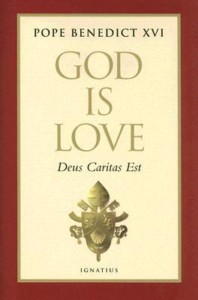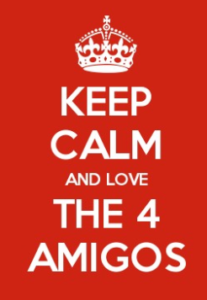Welcome to TOB Tuesdays Refreshed. Over the next few months we will revisit Katrina’s past blogs followed by Jack Henz’* reflection.
What is Love? by Katrina J. Zeno, MTS
 Welcome to TOB Tuesdays! My name is Katrina Zeno and every week we’ll spend a few minutes reflecting on an aspect of St. John Paul II’s monumental work, Man and Woman He Created Them, otherwise known as the “Theology of the Body.” Today’s topic is, “What Is Love?”
Welcome to TOB Tuesdays! My name is Katrina Zeno and every week we’ll spend a few minutes reflecting on an aspect of St. John Paul II’s monumental work, Man and Woman He Created Them, otherwise known as the “Theology of the Body.” Today’s topic is, “What Is Love?”
Early in my speaking career I gave a two-day workshop for the fledgling (but now robust!) organization, Family Honor. Halfway through the second day, one of the participants pointedly asked, “You’ve covered a lot of material, but why haven’t you said anything about love?”
Interiorly, I sputtered in my tracks. Exteriorly, I tried to refrain from expressing horror as I thought, “Love? What do you mean I haven’t said anything about love? That’s all I’ve been talking about – ‘gift of self’ is love!”
Somehow, in my mind, the connection was obvious. When St. John Paul II says, “Man…cannot fully find himself except through a sincere gift of himself,” [quoting Gaudium et Spes 24] it’s the same as saying, “The human person is created to express love through self-gift.” And yet, the connection wasn’t obvious to those taking my workshop.
Since that day approximately 15 years ago, my own understanding of love as total self-gift has gone through wave after wave of painful growth and expansion. Somehow, though, it seems our contemporary culture has been marching to a different drummer. The messages swirling around us announce, “Love is love!” “Love is a feeling!” “Love is willing the good of the other!” So, which is it?
Simply stated, two of these answers belong together and the third is misleading. Can you guess which one veers us away from the fullness of truth? The answer is: “Love is love” because it makes love self-referential.
“Why is this a problem?” you might ask. Because no reality can be defined by itself. For instance, what if my neighbor were to knock on my door and say, “I just received this deriza in the mail. Can you please tell me what it is?” And I respond, “Oh, that’s easy. A deriza is a deriza.”
How helpful is that? Not at all. In order to understand what something is, we have to define it by qualities and characteristics that are similar to but also distinguishingly different from other realities. (Think: A dog has four legs, a tail, fur, and it barks…)
So, then, what is love? How can we provide at least an initial definition of love within the confined space of a blog? The two other descriptions cited above provide a helpful foundation.
In oh so many Catholic circles, I’ve heard the following pronouncement as if it were definitive Catholic doctrine: “Love is not a feeling. It is willing the good of the other.” Is that true? Is love not a feeling?
Let’s run an experiment: If you were to ask any man why he married his wife, do you think his response would be: “I ran a cost-benefit analysis of my relationship with my girlfriend, and it was obvious that the best way I could will her good was to marry her.” Hardly the romantic response we anticipated, eh?
Of course love is a feeling. Parents love their children, often at first sight, with a startling intensity that is surprising even to them. Best friends love each other and can experience heart-wrenching grief when one moves to a faraway location. Soldiers feel a protective love for their country to the point of being willing to give their lives for their fellow citizens.
Love is indeed a feeling. However, it is not only a feeling. If love were simply an emotional sensation, then love would be temporary, fleeting, unpredictable, and terribly tragic. What happens when the love feelings are gone, evaporated? What is the right course of action? Do we then act on other feelings?
God’s love for you is eros; it desires and seeks union with the Beloved (that’s you). At the same time, God’s love for you is also totally agape; it always and only wills your good.
Mercifully, the gap caused by the absence of loving feelings is filled in by the will. The will can provide a stable and reasoned disposition even when feelings of closeness and connectedness disappear, or when persistent sacrifice and discomfort are required, or when infidelity or tragic loss slap us in the face.
 Love as both a feeling and an act of the will is true not only of our human relationships, but of our relationship with God. God doesn’t simply will our good, He moves toward us in an intimate bond of love. Pope Emeritus Benedict XVI daringly echoed St. John Paul II’s spousal understanding of salvation (see last week’s blog, Blog 4) in his first encyclical, “God is Love” (Deus Caritas Est). Cardinal Ratzinger/Pope Benedict XVI is known as a deeply interior, quiet, and rational thinker, and yet he clearly states: God’s love for man may certainly be called eros, yet it is also totally agape (see DCE, no. 9).
Love as both a feeling and an act of the will is true not only of our human relationships, but of our relationship with God. God doesn’t simply will our good, He moves toward us in an intimate bond of love. Pope Emeritus Benedict XVI daringly echoed St. John Paul II’s spousal understanding of salvation (see last week’s blog, Blog 4) in his first encyclical, “God is Love” (Deus Caritas Est). Cardinal Ratzinger/Pope Benedict XVI is known as a deeply interior, quiet, and rational thinker, and yet he clearly states: God’s love for man may certainly be called eros, yet it is also totally agape (see DCE, no. 9).
How’s that for a 6.6 magnitude earthquake? God’s love for you is eros; it desires and seeks union with the Beloved (that’s you). At the same time, God’s love for you is also totally agape; it always and only wills your good. Pope Benedict also wrote, “[M]an can indeed enter into union with God…. a unity in which God and man remain themselves and yet become fully one” (DCE, no. 10).
Wow! That’s the kind of God I want to be in a relationship with! That’s the kind of love I hope will permeate our entire culture because it has a content and a meaning that harken back to our being created male and female, to our being created for union and communion not only naturally, but supernaturally. God doesn’t want to blot us out or absorb us into Himself. He wants the two, you and God, to remain distinctly two and yet to become fully one. That’s true love!
God doesn’t want to blot us out or absorb us into Himself. He wants the two, you and God, to remain distinctly two and yet to become fully one. That’s true love!
This week, perhaps you could ponder this dual-dimension of love being both eros and agape, of being both a feeling and willing the good of the other, and allow it to expand making a gift of yourself (even when you don’t feel like it) into an act of eros, of becoming one with the other. And remember…you are a gift!
© Katrina J. Zeno, MTS
Jack Henz’ Reflection: What is Love? Funny, you should ask.
 On Thursday evenings, a couple times a month, I gather with three other Catholic men from my parish for fellowship, a cold beer, and manly conversation. We call ourselves The Four Amigos.
On Thursday evenings, a couple times a month, I gather with three other Catholic men from my parish for fellowship, a cold beer, and manly conversation. We call ourselves The Four Amigos.
Most often the conversation starts with sports and then turns to our Catholic faith and what it means to be a Catholic man. Sometimes we discuss tough questions that may be bothering one of us. It’s the perfect group to get a realistic, masculine viewpoint.
The Four Amigos are composed of a retired bus driver, a retired emergency responder (EMR), a former college professor, and me, a retired meteorologist. Katrina’s blogs are often a point of discussion, so, I asked them recently, “What is love – is it a feeling and/or willing the good of the other?”
From the immediate lack of response, it seemed as if I’d asked them to help paint my house in the heat of a Phoenix summer. I waited. Eventually the bus driver, the oldest Amigo, jokingly answered: “What is love? It’s five foot of heaven and a ponytail,” mimicking the lyrics of a once popular song by the Playmates in 1959. He always knows how to get the conversation ball rolling!
But finally, he said without fanfare, “I love God because he always loves me, even when I make a mistake. I try to do good for others, donate my money and time to numerous causes, and the parish is my family. I’d do anything for family, friends, and Church. If that’s willing the good of the other – then that’s love for me.”
The youngest Amigo, the EMR who was recently divorced, said he was confused about married love or any love was because his wife flat out no longer loved him. She was married to her job, and she loved power and money more than him. “God and I have a funny relationship,” he said. “When I was a first responder, God always had my back. I made a career of helping others and saving lives. He looked out for me. I have a deep emotional tie to Him because of all the close calls I survived. But when it comes to emotional human love that lasts with commitment,” he looked down at the table and shifted in his chair, “I’ve never experienced that kind of love. I’m still looking for it.”
My closest friend, “The Old Professor” has been married for decades. He started by saying he and his wife have a deep, intimate loving relationship. Lots of emotion is still there. Daily reception of the Eucharist and frequent visits to confession are his keys to reaching heaven. He is an RCIA catechist, leads Rosaries, and serves in St. Vincent de Paul. Instinctively, there’s a degree of willing the good of others in his life, although he acknowledged, “I don’t think about that often; I just do things for others.”
Then, the Old Professor turned to me and said, “And you dear friend, what do you say about love?” Quickly, I noticed three pairs of eyes looking at me. I took a long sip of cold beer to collect my thoughts while remembering Katrina’s words, “Love as both a feeling and an act of the will is true not only of our human relationships, but of our relationship with God.”
I looked them in the eye and then the words began flowing. “Okay, I’ll confess that my life has been a continual emotional-love roller coaster with lots of highs and many lows. However, the stabilizing influence in this rollicking ride has been choosing to do good for others and others choosing to do good for me. It keeps me pointed toward a deepening love with my wife, family, and God.”
I choose to build my life around loving God and let that love spill over into my relationships and what I do.
The three pairs of eyes kept their gaze fixed on me, so I continued, “Yes, I love the emotions, who doesn’t? But they can be fleeting. I choose to build my life around loving God and let that love spill over into my relationships and what I do.”
The table was quiet, almost too quiet. Then the bus driver slapped his left hand on the table, jarring each of us and blurted out, “I like that” followed by a nodding EMR and a smile on the face of the Old Professor. Before I could say anything, our waitress came over and the EMR said, “We’ll all have another round and the weather guy over there is buying.” Like I said, I enjoy doing things for the good of the others, including buying another round.
©by Jack Henz
We invite you to share your own 2-3 line reflection on our JPII Resource Center Facebook page by clicking here.
*Jack Henz is a retired meteorologist and a graduate of the Diocese of Phoenix ‘s Kino Catechetical Institute. Together with his wife Karen, he is a passionate catechist concerning all things Catholic, especially the Theology of the Body.




